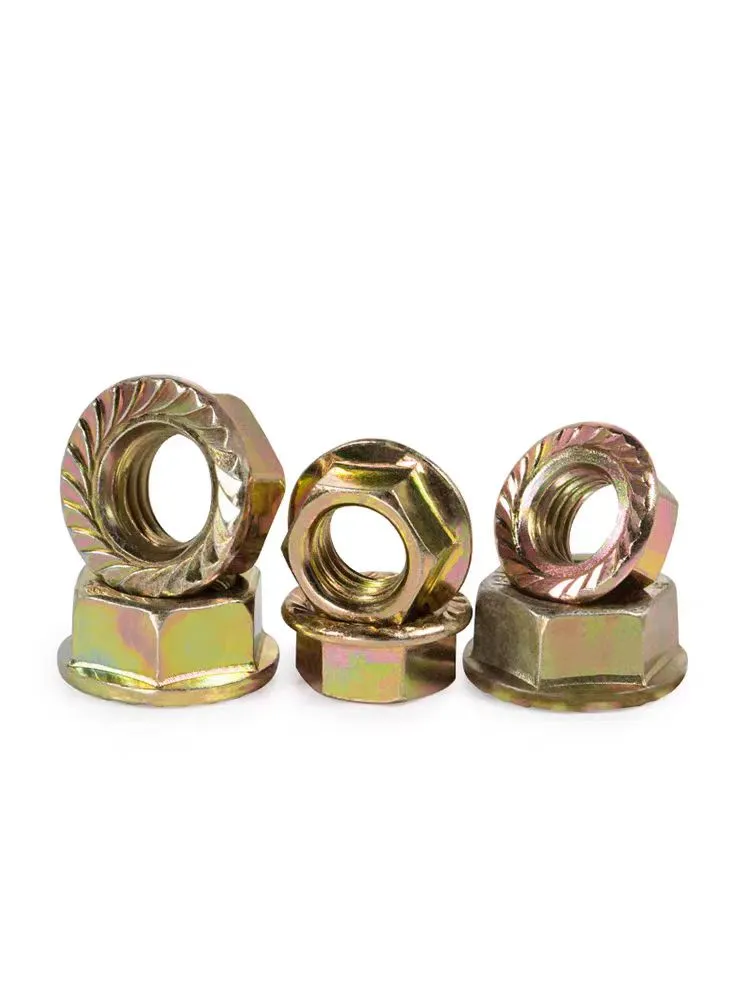

flanged weld nuts
Oct . 10, 2024 15:15 Back to list
flanged weld nuts
Understanding Flanged Weld Nuts A Comprehensive Guide
Flanged weld nuts are specialized fasteners that play an essential role in various manufacturing and construction processes. As a type of nut, they are designed to provide a sturdy connection between components in an assembly, ensuring durability and reliability in structural applications. This article delves into the features, benefits, applications, and installation techniques associated with flanged weld nuts.
What are Flanged Weld Nuts?
Flanged weld nuts are hexagonal nuts that feature an integrated flange on one side. This flange increases the surface area that comes into contact with the material being fastened, which enhances their load-bearing capacity. Typically manufactured from materials such as steel, stainless steel, or aluminum, these nuts are designed to be welded onto a surface, which means they do not require a traditional locking mechanism or threading on the part that they are attached to.
The main characteristic that distinguishes flanged weld nuts from regular nuts is their flange, which serves multiple purposes. Firstly, it acts as a heat sink during the welding process, reducing the risk of deformation that can occur when heat is applied. Secondly, the flange helps to distribute stress over a larger area, minimizing the possibility of failure under load.
Benefits of Using Flanged Weld Nuts
1. Improved Load Distribution The flange design allows for efficient load distribution across the material, making these nuts suitable for high-stress applications.
2. Reduced Assembly Time By allowing the nut to be welded directly to a surface, installation becomes quicker and simpler compared to traditional fastening methods that require multiple tools.
3. Increased Stability The additional support from the flange means that flanged weld nuts can offer better stability, especially in dynamic environments where vibrations may occur.
4. Versatility Flanged weld nuts can be used in a variety of materials such as aluminum, steel, and plastics, making them suitable for diverse industrial applications.
5. Space Savings By eliminating the need for separate fastening hardware, these nuts can save space in assemblies, allowing for more compact designs.
Applications of Flanged Weld Nuts
Flanged weld nuts are widely used in numerous industries, including but not limited to
flanged weld nuts

- Automotive In vehicle manufacturing, flanged weld nuts are commonly used to secure body panels and other components, providing a reliable connection that can endure high levels of stress.
- Construction In structural steel applications, these nuts are used to fasten beams and columns, ensuring stability and strength in buildings and bridges.
- Electronics Flanged weld nuts can be found in electronic equipment, where they provide secure attachment points for casings and internal components.
- Furniture In the manufacturing of metal furniture, flanged weld nuts are employed to create strong joints that enhance the product's longevity.
Installation Techniques
The installation of flanged weld nuts typically involves the following steps
1. Positioning The welder positions the flanged weld nut on the workpiece, ensuring that it is accurately aligned for optimal strength.
2. Tack Welding A tack weld is applied to hold the nut in place. This allows for adjustments before the final welding process.
3. Final Welding The nut is then fully welded to the surface using a suitable welding technique, such as MIG or TIG welding, depending on the materials involved.
4. Inspection After welding, it’s essential to inspect the connection for any defects or weaknesses, ensuring safety and structural integrity.
Conclusion
Flanged weld nuts offer several advantages that make them a favored choice in many industries. Their robust design, combined with ease of installation and versatility, makes them indispensable for applications requiring reliable and durable fastening solutions. Whether in automotive manufacturing, construction, electronics, or furniture production, understanding and utilizing flanged weld nuts can significantly enhance the performance and durability of constructed products. As industries continue to evolve and demand more efficient manufacturing processes, the importance of efficient fastening solutions like flanged weld nuts cannot be overstated.
Latest news
-
High-Strength Hot Dip Galvanized Bolts - Hebei Longze | Corrosion Resistance, Customization
NewsJul.30,2025
-
Hot Dip Galvanized Bolts-Hebei Longze|Corrosion Resistance&High Strength
NewsJul.30,2025
-
High-Strength Hot-Dip Galvanized Bolts-Hebei Longze|Corrosion Resistance&High Strength
NewsJul.30,2025
-
Hot Dip Galvanized Bolts-Hebei Longze|Corrosion Resistance&High Strength
NewsJul.30,2025
-
Hot Dip Galvanized Bolts - Hebei Longze | Corrosion Resistance, High Strength
NewsJul.30,2025
-
High-Strength Hot Dip Galvanized Bolts-Hebei Longze|Corrosion Resistance, Grade 8.8
NewsJul.30,2025

